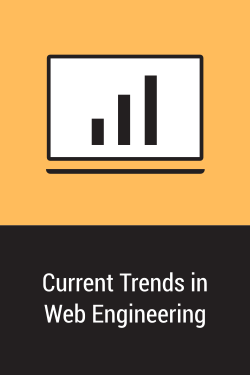
Module 553010
Current Trends in Web Engineering (WS 2018/2019)
Lecturer

Contact
If you have any questions concerning this course or the exam as a participant, please contact us via OPAL.
Announcements
The first lecture will be on Tuesday October 8th 2018.
The tutorial will start later in the semester. We will announce the concrete date on our website and in the lecture.
The lecture on 15th January 2019 will not take place and is postponed to the following week.
Conduct
The lecture Current Trends in Web Engineering is typically offered in the winter semester.
SWS (L/T/S/P): 2/2/0/0
Contents
Social media and social networks in the sense of cross-border networks change our perception of communication structures and induce social, economic and political changes. The communication infrastructure has dramatically changed on a regional, national and global levels over the past two decades. What about today? Do social media and networks constitute a chance for all communicative processes? How can one derive new applications from the mass of data and inter-connections, which are already available on the Web and keep steadily increasing via Social Media? What is the potential in the observation of these developments, and how can they be taken under control?The module starts off by covering the basic aspects of social networks and social media as well as web science. Thereby, the addressed questions play an important role. The topic conveyed include architectural aspects, system theory and emergence-related phenomena such as self-organisation. Furthermore, technologies, frameworks and standards, such as protocols and relevant ontologies will be covered. Moreover, current trends and issues in those areas will be investigated in-depth by means of related research literature and discussions.
Qualification Objectives
- Overview of the fundamental questions and problems in the areas of social media and web science
- Understanding of the emergence phenomena; standards, protocols, ontologies as well as approaches, models, technologies, principles and tools to work with and use social media and web science
Prerequisites (Recommended)
- Computer Networks
- Software Service Enginnering
- XML
Semester Recommendation
Schedule
Please subscribe to the tutorial via OPAL.
Material
Lecture Slides
Homework
Till 22.01.2019
Goal is to discuss the technologies, architecture, principles, methods, and processes used in the new trend defined by the project solid, which focuses on giving users control over their data back in a revolutionary way.
Please also check out and read the corresponding documents of the solid community for discussing in the next lectures:
- https://solid.inrupt.com/docs/getting-started(MUST-READ document)
- https://solid.mit.edu
- https://solid.inrupt.com
- https://medium.com/@timberners_lee/one-small-step-for-the-web-87f92217d085
Till 27.11.2018
Try to find out and understand what User Story Mapping, Experience Maps & Customer Journey Maps is all about - and how to apply and use these tools.
Here are some Web-URLs to start with:
- http://uxmastery.com/how-to-create-a-customer-journey-map/
- http://mappingexperiences.com/
- https://hbr.org/2010/11/using-customer-journey-maps-to/
- http://www.dubberly.com/articles/interactions-the-experience-cycle.html
- http://www.servicedesigntools.org/
- http://www.slideshare.net/frogdesign/brugnoli-system-ux-1061731
The following book might also provide very good insights:
User Story Mapping, By Jeff Patton Edited By Peter Economy Foreword By Alan Cooper, Martin Fowler, Marty Cagan Publisher: O'Reilly Media
Please prepare examples from university life to demonstrate during the lecture, e.g. the registration process to become a Master Student or the process from searching for to finishing the BSc project.


